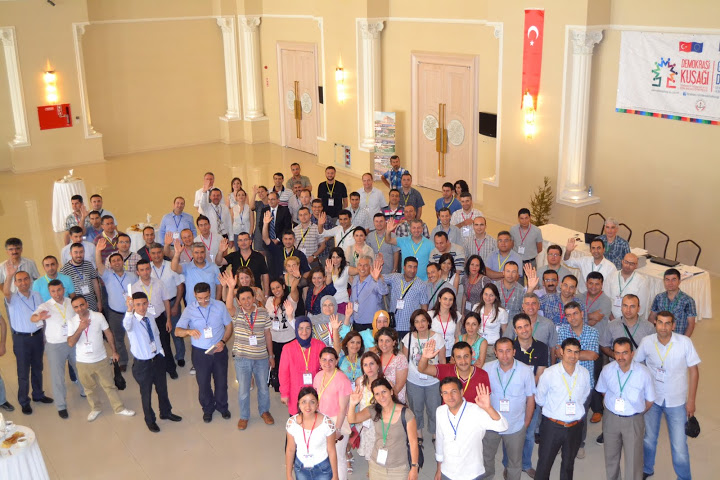Democratic Citizenship and Human Rights Education in Turkey
News
Minister Nabi Avcı Attended Generation Democracy - Conference in Turkey
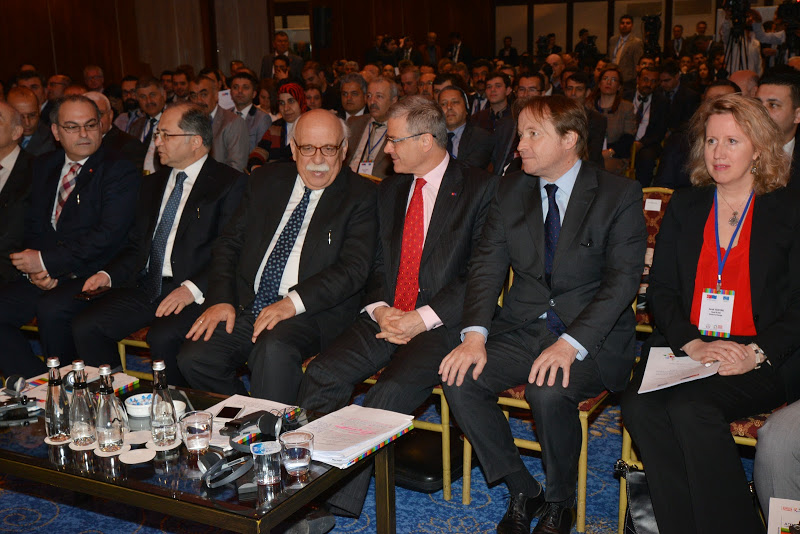
14 April 2015, Istanbul - The Minister of National Education, Nabi AVCI opened the closing conference of about 350 participants from Turkey and from other member states of the Council of Europe who met to celebrate the achievements and to reflect on the lessons learned from the four-year 6.1 million Euro project Democratic Citizenship and Human Rights Education (“Generation Democracy”), funded by the European Union and implemented by the Council of Europe in partnership with the Ministry of National Education and the Board of Education.
Minister Avcı said “this project has shown to all of us and especially to our students once again that demoracy is not just a political concept but it is also a culture of living. We once again witnessed how important democracy is both in the management of schools and management of education. I home these practical applications will continue at a growing pace.” Minister Avcı went on to say “schools will become more appealing to students and will also be a place where teachers find peace once our administrators, politicians and our governors digest and fully adopt democratic culture and not only those involved in tuition. This project has contributed to this and will continue doing so in the future.”
Minister Avcı thanked everyone for their contributions to the Project led by European Council Democratic Citizenship and Participation Director Jean-Cristophe Bas, the Charge d’Affaires of the European Union Delegation for Turkey Bela Szombati, Country Coordinators for Democratic Citizenship and Human Rights, the Director General of the Turkish Education Board and the European Union and Foreign Relations General Director. Later Minister Avcı toured the exhibition where the printouts of the works at the schools participating in the Project were displayed.
Generation Democracy was given the Democracy Innovation Award
Generation Democracy received Democracy Innovation Award in the scope of World Democracy Forum, organised in Strasbourg on 3 - 5 November 2014
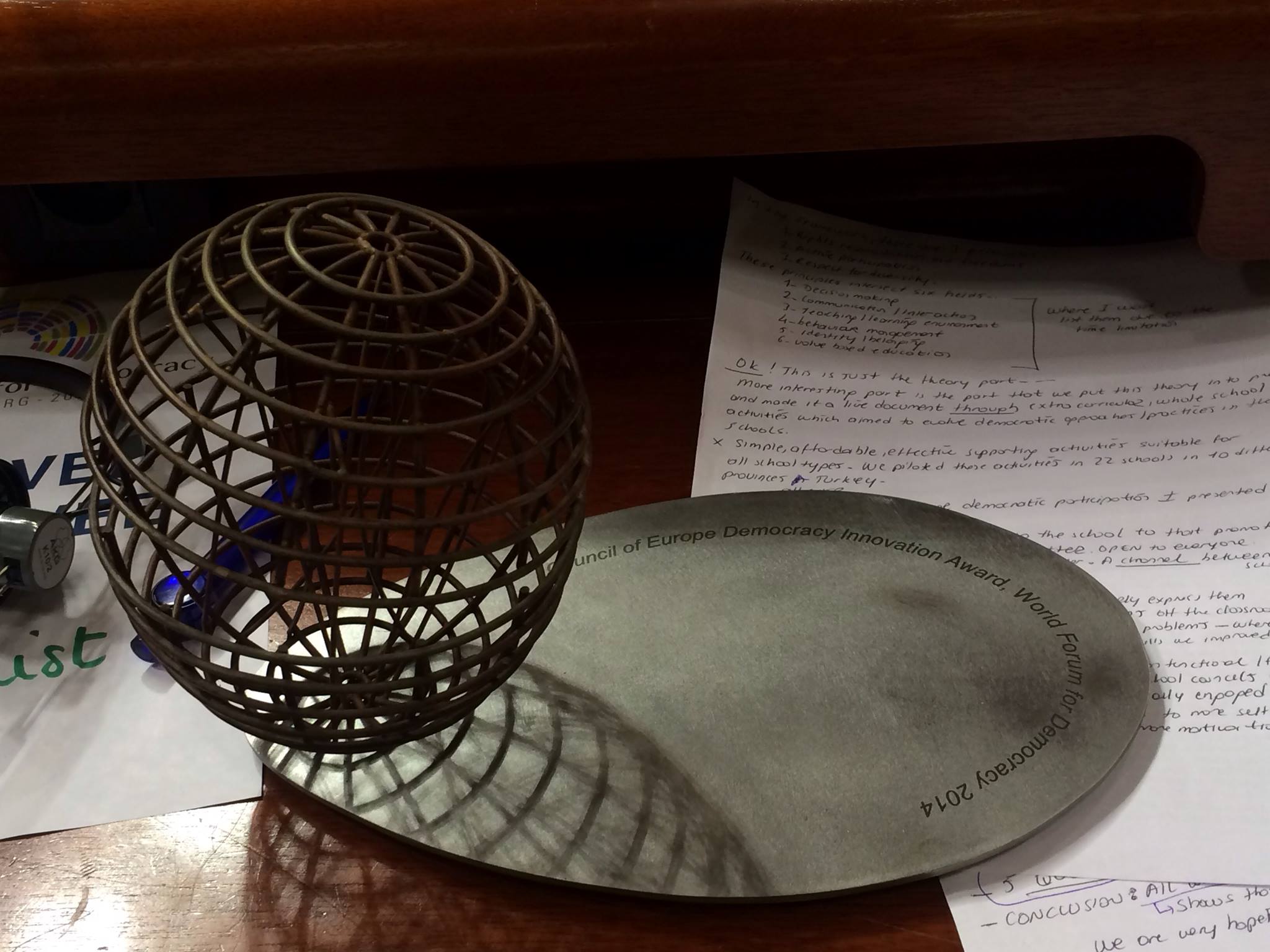
The Council of Europe, during the closing session of the World Forum for Democracy, presented its Democracy Innovation Award to Generation Democracy. The prize is a reward for efforts to get citizens more involved in public life and the democratic process. The aim of Generation Democracy is to encourage education for democratic citizenship and human rights education in the Turkish education system. Pilot projects have been conducted in 22 schools spread across 10 provinces of Turkey in order to find an answer to the question: “What makes a school culture more democratic?”.
Seven initiatives were shortlisted for the final vote from the 30 or so presented during the Forum:
Stork Heinar, a parody of Nazi ideology (Germany) – lab 5
Chabab 2012, the Circle of Young Democrats of Morocco – lab 16
the Alsace Youth Parliament – lab 13
the Blue Ribbon Movement (India), a leadership development programme – lab 1
Generation Democracy – lab 8
Youth Create Change, a local governance and civil society development programme in eleven municipalities of the West Bank and Gaza Strip – lab 10
Young Democracy Creators (France) – lab 21
The Award was handed over to Seda Arican Maslen, one of the Senior Project Officers of Generation Democracy who made the presentations on behalf of the Project, by the Secretary General of the Council of Europe, Thørbjorn Jagland, and the Deputy Secretary General, Gabriella Battaini-Dragoni, in the presence of Goretti Zavagu Amuriat, from last year’s winner of the Award, the Women of Uganda Network (WOUGNET).
Democratic School Culture - A new phase of expansion and consolidation
The activities to be implemented in the scope of extending Democratic School Culture will be shared with the principals and teachers of the new volunteer schools at a launching event which was opened by Mr. Orhan Erdem, the Deputy Minister of National Education.
In the Launching Event, which was held on 23 October 2014 at Sheraton Hotel, Miss Selin Bulut, a student from Elazığ Tevfik Yaramanoğlu Primary School Mr Francois Begeot, Counsellor from the European Delegation to Turkey, Mr Jean-Cristophe Bas, Director of Democratic Citizenship and Participation, Council of Europe and Mr Orhan Erdem, the Deputy Minister of National Education gave opening speeches.
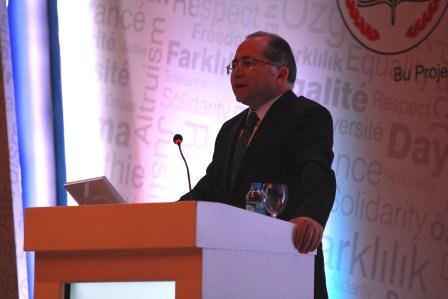
Prof. Emin Karip, Head of the Board of Education, addressed the guests before the opening speeches and summarised the main outcomes of the Project. He specifically underlined that democratic behaviours and values can only be gained at an early age and explained the background and the ongoing work about the "human rights, citizenship and democracy" course which is being developed for the 4th grade in primary schools. After his address, Prof. Karip gave the floor to Selin Bulut, a student from Elazığ Tevfik Yaramanoğlu Primary School.
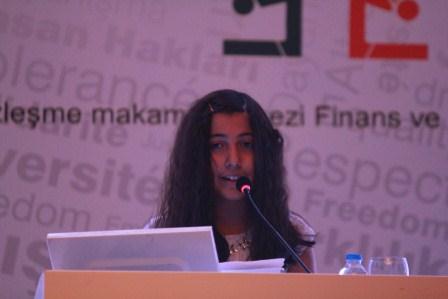
In her speech, Selin gave some examples about the activities they implemented in their school in the scope of Generation Democracy and talked about her feelings, as well as of her friends, teachers, parents and school managers throughout the activities. She also summarised what she has learned as follows: "In this Project, I learned love, respect and tolerance; solidarity, cooperation, and trust. I also learned what democracy is, how a democratic school should be and the importance of promoting democracy. But above all, I learned how to be a good person."
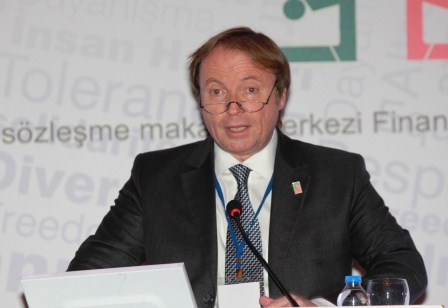
In his opening remarks, Mr Jean-Cristophe Bas, the Director of Democratic Citizenship and Participation, underlined that Turkey is in a very special position, and that there is a necessity to instill the values that are inherent to the Project, such as diversity, tolerance, and respect, through education. He expressed the project outcomes so far has been really impressive. Bas also stated that learning ‘about’ democracy is really important, but it is far more beneficial to learn throguh democracy by experiencing the democratic environment at school at an early age. He further said that during the establishment of a democratic school culture, school managers, teachers, parents, and students develop their skills to reach a consensus and to take an active role in social life and he made some quotations from the interiew carried out with different stakeholders of the project: “in all these activities everybody’s idea is asked and when you are asked your opinion I think you feel important.” 13-year old student in Samsun; “To be honest, when we were first informed that we were selected as a pilot school and that we were going to carry out the activities, as School Principal, I regarded it as a total burden. But as I understood the project, I realised I should change myself, and I started to ask myself how democratic am I? What kind of relationships do I have with the children, my colleagues, my subordinates?” Middle School Principal in Konya. Jean-Cristophe Bas concluded his speech by expressing the intention of the Council of Europe to provide the best possible visibility fort he projecy and inviting all parties to pursue a folloup of the Project results and design new projects.
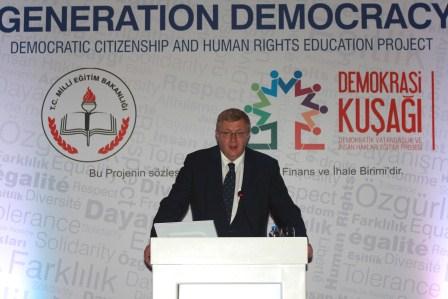
The Counsellor Francois Begeot, in his speech on behalf of the EU Delegation to Turkey, talked about the role of democratic citizenship and human rights education in building democratic societies and emphasized that Turkey has been very successful not only on a national but also on an international level. Specifically targeting school managers and teachers, Begeot stated that they are crucial actors in raising a democratic society and thanked them for their contribution to the Project. He further stressed that thanks to all these efforts, sustainability of democracy can be guaranteed.
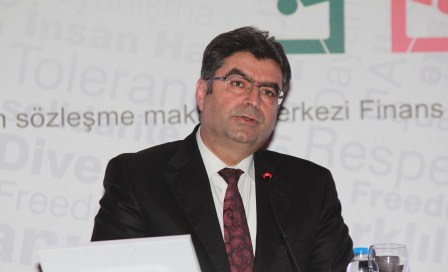
In his opening remarks, the Deputy Minister of National Education expressed his ideas on the importance of democratic education as follows: "Education for democracy is important in creating a democratic society in terms of raising individuals who think and inquire, with full awareness of his rights and responsibilities because all the activities carried out in the field of education reflect on all the levels of society and shape our future. When the accelerated pace of our country’s efforts in democratisation and increasing demands of the society for democracy are considered, we expect that these activities will considerably contribute to our country
The Democratic School Culture activities are going to be extended to 88 new schools in pilot provinces between November 2014 and March 2015. In this scope, the existing Project pilot schools are expected to guide the new schools and provide support when needed. At the end of this process, which is based on exchange of experiences among schools and which has the potential to contribute to the overall success of the school, the ultimate aim is to make progress in consolidating a democratic school culture in schools. The results and outputs of the activities implemented by pilot schools so far were displayed in an exhibition on 23 - 24 October 2014 at Sheraton Hotel.
7th Project Steering Committee Meeting
The 7th Project Steering Committee Meeting of Democratic Citizenship and Human Rights (Generation Democracy) Project was held on 23 October 2014 at Sheraton Hotel.
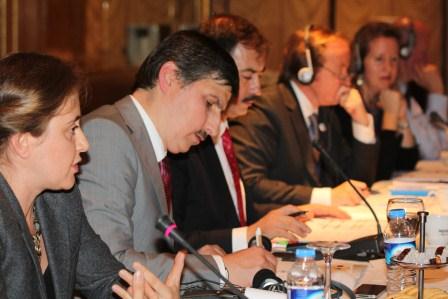
The meeting which was chaired by Mr Muhterem Kurt, the Deputy Undersecretary of the Ministry of National Education and the Senior Programme Officer of the Project and it brought together representatives of relevant General Directorates of the MoNE, Central Finance and Contracts Unit, the EU Delegation to Turkey, the Ministry of EU Affairs, the Beneficiary, NGOs, and other relevant stakeholders. Mr Jean-Cristophe Bas, Director of Democratic Citizenship and Participation, Council of Europe; Ms Sarah Keating, Head of Unit for Regional and Bilateral Co-operation - South East Europe, Council of Europe; Ms Eser Canalioğlu, Sector Manager, Delegation of the European Union to Turkey, and Mr Muhterem Kurt, Deputy Undersecretary and Project SPO made the opening remarks.
In his opening speech, Mr Jean-Cristophe Bas talked about the programmes and activities carried out by the Council of Europe in the field of education for democratic citizenship and human rights education in general and based on his experience in the field he stated that Generation Democracy has achieved very tangible results, which he considered to be really impressive. He further added that the Ministry has played a very constructive role since the beginning of the process and created a real momentum, which should be benefited from. Ms Sarah Keating underlined the importance of quality education in her opening speech. She talked about the outcomes brought about by democratic school culture and added that she had the chance to witness how democratic school culture is exercised in the daily life of the school in a field visit to Mardin. With the help of this culture, she stated that there has been improvement in absenteeism levels and also the overall quality of education has increased. Furhtermore, she explained that a multi-dimensional and approach was adopted in capacity building activities, through which a number of activities aiming at enhancing the capacity of all stakeholders of the school have been implemented. She also stated that there has been a very harmonious and close cooperation among project partners since the start of the project. Ms Keating concluded her words after announcing that the Final Conference Project will be held in İstanbul in April 2015 together with the EDC/HRE Coordinators Meeting and expressing her wishes to cooperate further with the Ministry of National Education after the successful completion of this Project.
Speaking on behalf of the European Delegation to Turkey, Ms Eser Canalioğlu expressed that the ownership of the project on both sides, namely by the Ministry of national Education and by the Council of Europe, is very strong, which is very important and pleasing. Ms Canalioğlu also added that they have supported the project since the very beginning, and they are willing to support new project ideas for the future as well. Mr Muhterem Kurt, the Deputy Undersecretary, listed the main outcomes of the project and expressed the positive opinion of the Ministry on these accomplishments. He further added that Turkey has a very special geographical location, which makes it a vital bridge between the East and the West in strengthening democracy.
Think Global - Act Local

A Joint Meeting of the Council of Europe Network of Coordinators for Education for Democratic Citizenship and Human Rights Education and of the Pedagogical Club of European Capitals, which was held in Strasbourg on 21-22 October in the framework of the European Local Democracy Week, explored the current challenges in the area of citizenship and human rights education, and in particular the role and contribution of local authorities in this area. The participants discussed possible avenues for future action and for strengthening cooperation and networking at different levels
Democratic School Culture - A new phase of expansion and consolidation
The activities to be implemented in the scope of extending Democratic School Culture will be shared with the public at a launching event which will be opened by Prof. Dr Nabi AVCI, the Minister of National Education. The event will be held on Thursday 23 October 2014 in Ankara with the participation of students, teachers, and school principals of pilot schools, as well as the school principals and teachers of the new schools which will be a part of the implementation.
The Democratic School Culture Competences Framework, which was piloted in 22 schools in 10 provinces during 2013-2014 academic year, was revised in the light of the feedback received from schools' stakeholders. The activities implemented and suggested by the schools were compiled in a "Compendium of Good Practices". The results of the pilot implementation show that students have better chances to express themselves more freely; they are more likely to adhere to decisions when they are also included in the decision-making process; they actively take part in solving their problems; and eventually all the sectors help increase not only their social but also their academic capacity. The Democratic School Culture activities are going to be extended to 88 new schools in pilot provinces between November 2014 and March 2015. In this scope, the existing Project pilot schools are expected to guide the new schools and provide support when needed.The activities which were implemented by pilot schools during the pilot implementation will be introduced to new schools in a fair, which will provide a platform for the schools to share their rich experience with the new schools. At the end of this process, which is based on exchange of experiences among schools and which has the potential to contribute to the overall success of the school, the ultimate aim is to make progress in consolidating a democratic school culture in schools.
Introduction to the System of Guide Schools – 13 - 14 September 2014, İzmir
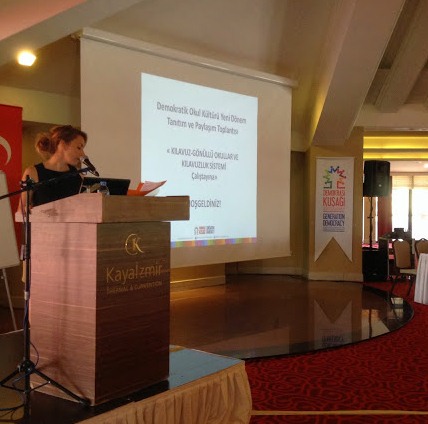
The Democratic School Culture activities are going to be extended to 88 new schools in pilot provinces between November 2014 and March 2015. In this scope, the existing Project pilot schools are expected to guide the new schools and provide support when needed. The methodology and the road map to be used and followed by the pilot schools in this new phase of guidance were shared with them in a workshop held on 13-14 September 2014 in İzmir. At the opening of the workshop, Ms Seda Arıcan, Senior Project Officer, Council of Europe, addressed the school principals and teachers of pilot schools and emphasized the importance of their work and contribution since the beginning of the project and stated that their support in the new phase of expansion and consolidation will also be highly valuable.

Dr Hüseyin Şirin, Board Member and EDC/HRE coordinator for Turkey, made an opening speech on behalf of the Board of Education and thanked the school principals and teachers of pilot schools for their hard work and the important resulst they have achieved so far. He added that in this field such hard work requires devotion and added that in order to consolidate a democratic school culture at school, all stakeholders need to be included in the process. Dr Şirin underlined that the Board of Education has also adopted a similar approach in which stakeholders are much more involved in the process and which is much more transparent and added that a crucial example of positive outcomes of such an approach is the new textbook review system. He concluded his remarks by highlighitng the role of pilot schools in guiding the new schools and repeated that the Board of Education has full confidence in them.
8 - 12 September 2014, Generation Democracy Training of Trainers (ToT) – second group
The second training seminar followed in the week of 8 - 12 September in İzmir. Mr Michael Ingledow, Head of Council of Europe Ankara Programme Office and Mr Muhterem Kurt, Deputy Undersecretary of the Ministry of National Education made the opening speeches.

In his opening remarks, Mr Michael Ingledow, the Head of Council of Europe Ankara Programme Office, stated that the Council of Europe carryies out an extensive programme of activities in the field of Human Rights, Rule of Law and Democracy in accordance with a large body of conventions. He further added that Turkey, a long-standing member of the Council of Europe, has ratified most of these conventions and has been in close cooperation with the Council of Europe in implementing them. Mr Ingledow concluded his opening remarks by underlining the importance of the achievements of Generation Democracy.

Mr Muhterem Kurt, the Deputy Undersecretary of the Ministry of National Education, started his opening speech by stating that he also worked as a classroom teacher and a school principal for 18 years. Stating that in addition to the education provided in schools, families also play an important role in establishing a democratic school culture and helping students develop specific skills and gain some specific values, Mr Kurt underlined the importance of organising some awareness raising activities for parents. He thanked all the partners who contributed to the project achievements so far and concluded his remarks by expressing his confidence in classroom teachers to teach the 4th grade Human Rights, Citizenship and Democracy course in the most effective possible way. Mr Kurt also spent the coffee break talking to teachers before answering our questions in a short interview.
The "Training Diary" which includes the short texts written by the teachers participating our seminar and the text of our interview with Mr Muhterem Kurt, the Deputy Undersecretary the Ministry of National Education will soon be published on our website.
1 - 5 September 2014, Generation Democracy Training of Trainers (ToT) continue – this time with classroom teachers
The fourth ToT in the scope of the Democratic Citizenship and Human Rights Education (Generation Democracy) Project, which is financed by the European Union and the Republic of Turkey and implemented by the Council of Europe with the ownership of the Board of Education, kicked-off in İzmir on 1 September 2014.
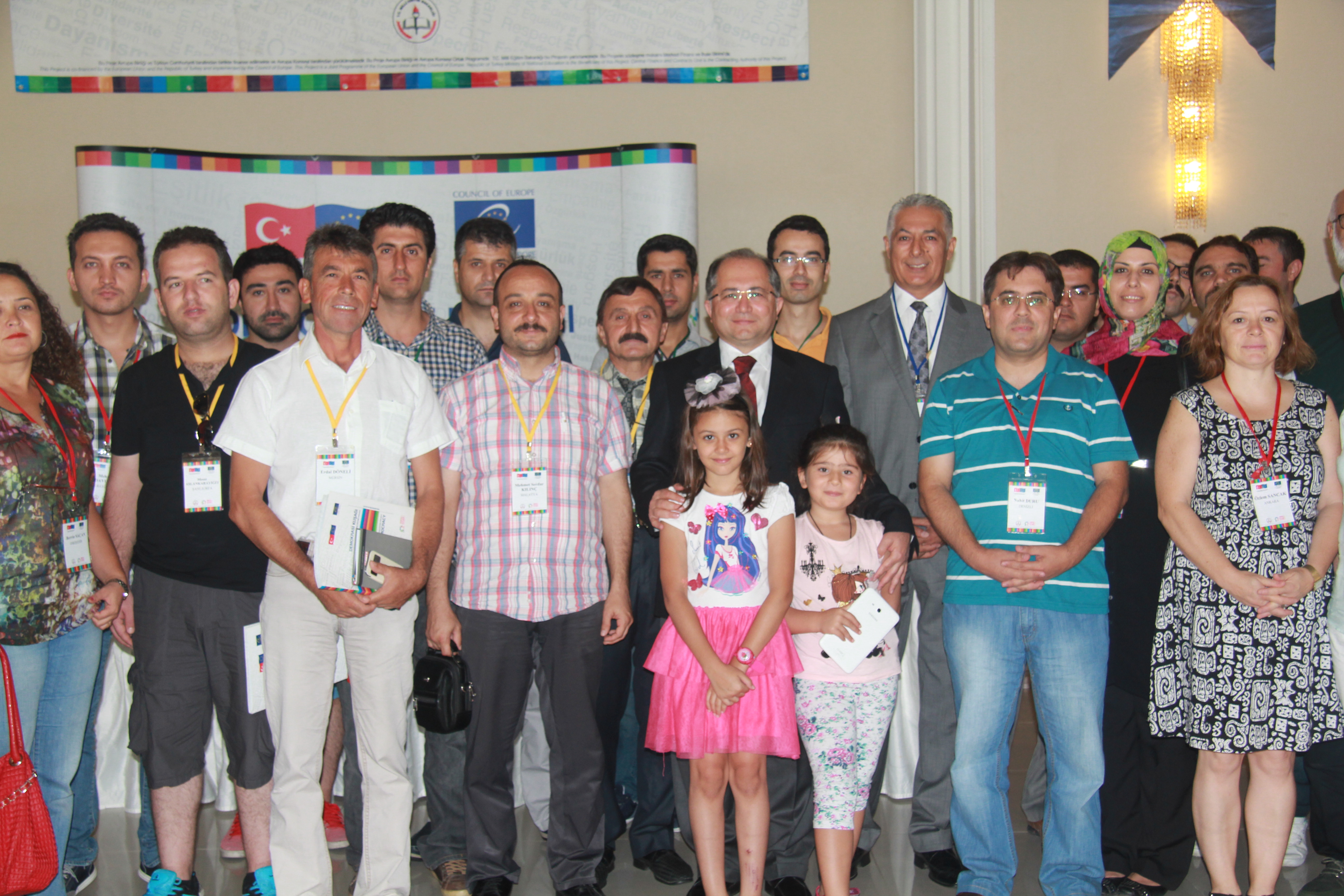
Generation Democracy aims to foster a more democratic society by strengthening Democratic Citizenship and Human Rights Education in Turkey. Pursuing this objective, education legislation and curricula have been reviewed in the light of EDC/HRE principles and recommendations have been made since the beginning of the Project in 2011. In addition, the elective course curriculum on Democracy and Human Rights for secondary education and its text book have been revised and approved by the Board of Education (BoE) to be taught in all high schools as of 2014 – 2015 academic year. Materials have been developed to increase the level of EDC/HRE awareness in the society and series of in-service training seminars, information meetings and workshops have been organised to increase the professional competence and to strengthen the capacity of the Ministry of National Education personnel. Only a democratic school environment can ensure that the concepts learned on knowledge level are transformed into skills and reflected on one’s attitudes and behaviour. The Democratic School Culture Competence Framework and good practices which have been developed as a guide to strengthen the capacity of our schools are important outputs of the Generation Democracy Project.
In the scope of capacity building activities, a three-step training was provided to 173 history and philosophy teachers between June and September 2013 and in January 2014. These teachers then carried out 2-day cascade training seminars to their colleagues in their provinces. In total, around 2000 philosophy and history teachers were trained in 55 seminars in different provinces in the framework of cascade training. The Board of Education made some changes to the table of courses and included a course on Human Rights, Citizenship and Democracy to be taught in the fourth grade of the primary school starting from 2015-2016 academic year. The curriculum of this course which will replace the existing course on Citizenship and Human Rights in the 8th grade is being developed in the scope of Generation Democracy Project. The draft curriculum was shared with a group of classroom teachers in a workshop in June 2014 and was revised in the light of the feedback.
A series of in-service training seminars have been planned to introduce the draft curriculum for Human Rights, Citizenship and Democracy course to classroom teachers and get their feedback, as well as increasing their capacity in terms of specific methods and techniques that they will need while teaching the course. In this scope, 400 classroom teachers from all around Turkey will attend a 5-day training programme in groups of 100. The teachers who have attended this training are expected to deliver a similar training to their colleagues back in their own provinces.
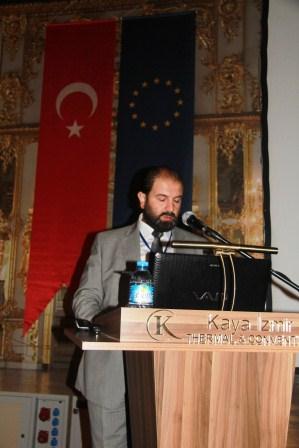
The first of these training seminars planned by the Capacity Building Working Group was organised in İzmir between 01 and 05 September 2014, with the participation of 93 classroom teachers. Ahmet Murat Kılıç, Senior Programme Officer from the Project team of the Council of Europe and Prof. Dr Emin Karip, Head of Board of Education made opening remarks in the beginning of the seminar. Mr Kılıç, who talked about the work of the CoE in the field of EDC/HRE, emphasised that Generation Democracy is the biggest Project in this field in terms of its scale and scope. Mr Kılıç also underlined that teachers have a key role in the bringing-up of today’s young citizens and the new course can only reach its target with the help of the teachers.
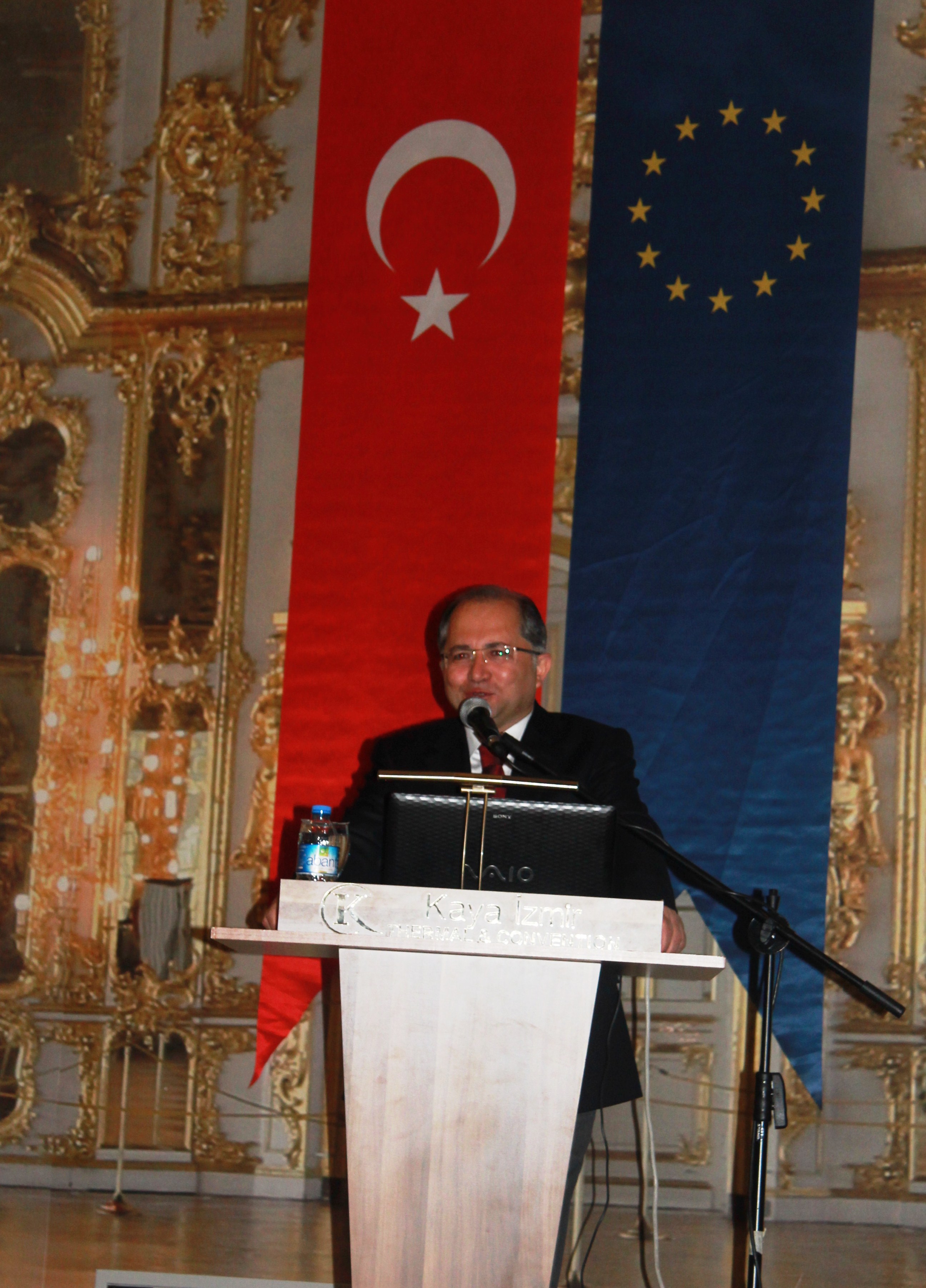
Drawing attention to the importance of citizenship education for the Ministry of National Education, Mr Karip stated that democratic citizenship and human rights education whose main aim is to establish a democratic school culture and develop an awareness of living together is a part of the ongoing transformation of curricula since 2005. He further added that the ultimate goal is to raise individuals who know that they should not hurt themselves or other people around them and have developed necessary skills to live together in harmony and underlined that such a level of awareness can only be ensured if we start at an early age. He also emphasised the fact that classroom teachers have a great potential to establish a democratic understanding and help students develop democratic behaviour, and that they play a greater role than other subject teachers or higher grade teachers in terms of the age group they address. Explaining that democracy culture can be established on the existing historical and cultural values of a society, and hence, it cannot be imported from another place or country, Prof. Dr Karip underlined that we need to see the opportunities and advantages of our country and built our democracy culture on this solid ground In addition, he stated that taking abstract concepts as a starting point in this field of education would be a mistake, and reminded that the needed values and concepts do exist in our own culture.
Prof. Dr Karip concluded his opening remarks by clearly stating their expectations from the participants: “We expect you to be highly generous in sharing your experience and your knowledge with others. Do not tell children how virtuous or honourable they are or they should be. They will certainly need this knowledge, but first you need to believe in it and you need to be able to convince your students. Living and experiencing together rather than telling should be your key, you need to be a model that embraces and encourages values. Classroom teachers have profound impact on students’ lives. They are role models for many of us.”
Round Table Meeting with the Civil Society
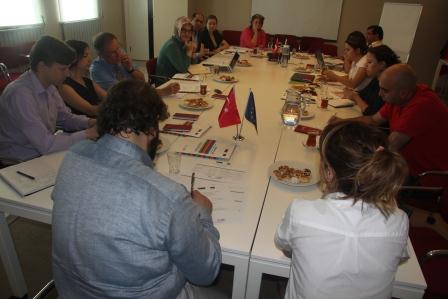
On 26 June 2014 Thursday, a round table took place bringing together the representatives of civil society organisations which work in the field of democratic citizenship and human rights education, human rights and children's rights at the premises of the Council of Europe Ankara Programme Office. Ms Pınar Başpınar, the Deputy Head of the CoE Ankara Programme Office opened the meeting emphasizing that this thematic round table meeting with civil society organisations constitute the first example for the Ankara Programme Office and added that she hoped it will also be adopted by the other projects. Ms Eser Canalioğlu Çınar, Sector Manager on behalf of the Delegation of the European Union to Turkey also stated that Generation Democracy project has adopted an inclusive approach regarding civil society organisations from the very beginning and mentioned her appreciation of the round table meeting. On the agenda were the curriculum to be developed for the 4th grade compulsory course on "Human Rights, Citizenship and Democracy", which will be taught as of 2015-2016 academic year and training seminars that are planned for teachers. The most distinctive feature of the meeting was that all participants were experienced and equipped in human rights education, children's rights and teacher training. At the end of this rather fruitful meeting, the representatives of civil society organisations made significant contribution to the upcoming activities in the next one-year both with the experience they shared and transferred and with the concrete recommendations they made as a result of the interaction during the meeting.
Praise to Generation Democracy
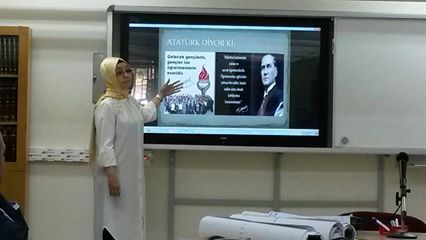
Rather than trying to explain what we try to do in the field, sometimes it is much better to listen to the people who have taken part in our activities. Here we would like to quote directly from Ms Fatma Nur Sarıaltın: "Dear colleagues/teachers, I spent last year trying to implement the innovative teacher model, which I learned during the seminars delivered by Generation Democracy. In my lessons, I used the activities developed during the project and I photographed some of them, and the topic of my end-of-semester seminar was "how to develop best practices". In my presentation, I showed the photos I took during my lessons and I emphasised that teaching profession should change. Believe it or not, I immediately started getting the signals that everything will start to change. My colleagues stated that my presentation made them seriously think about what they can do adn they asked for my notes and documents. This whole thing reminded me of the video Ahmet Murat Kılıç showed to us. The one about a man who starts dancing by himself and is followed by many people joining him one by one. I felt that I was like this man. I BENEFITED GREATLY FROM GENERATION DEMOCRACY AND IT CHANGED MY PERSPECTIVE COMPLETELY. IT HAS BEEN THE BEST THING I HAVE DONE IN MY LIFE TO GET INVOLVED IN THIS PROJECT. I WOULD LIKE TO THANK EVERYONE."
Good practice from our pilot primary school in Elazığ
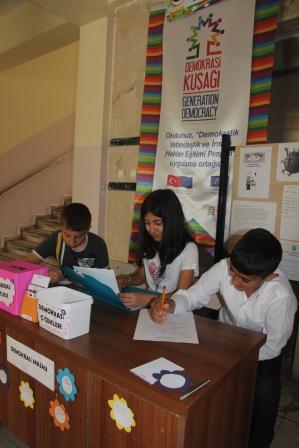
On 6 June 2014, early in the morning we were at Tevfik Yaramanoğlu Primary School, which is one of our pilot schools in Elazığ. The close relationship and strong cooperation among the school management, coordinating teachers, counselling teachers and the PTA was really striking. With the help of mutual support they can easily overcome many challenges and put into practise the decisions they make together with students. In addition, the representatives of the PTA underlined the contribution of the female members of the PTA management board, who have been a part of the management since last year. For the first time we had the chance to speak to a fair number of parents. Parents explained that especially introverted students have improved their social skills thanks to the activities organised in the scope of Democratic School Culture and concluded that they will look for a similar environment in the middle school which their students will attend after completing primary school. With the ownership of the school principal, Mr Veysel Top and the strong coordination of Ms Fatma Gülşah Aktı, the counselling teacher and Ms Gülten Çelik Bulut, the coordinating teacher democratic school culture activities have been conducted extensively empracing the whole school, and thus, all the students we spoke to were familiar with the project and its activities.
We were at our pilot schools in Konya again
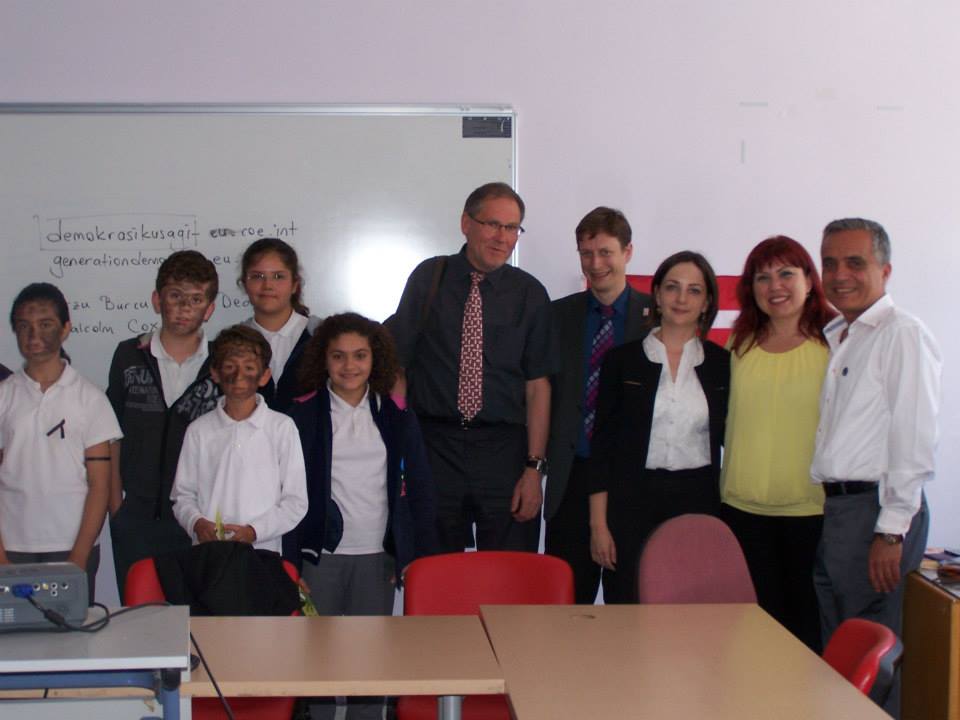
On 15 May 2014, our stop was Konya. Like in Samsun, our aim was to see how democratic school culture activities are implemented and to interview those who took part in the activities after a long while. Claude Kieffer, long term expert who has recently joined our team, also had the opportunity to see our pilot schools and to have one-to-one dialogue with the implementers of the activities, while malcom Cox, our evaluation expert, had the chance to meet school managers, teachers, students, and parents and ask how they feel about democratic school culture activities.
We spent the first half of the day in Mareşal Mustafa Kemal Middle School. Before we settled in the school principal's room, Kamil Ural, the principal himself took us around and showed the broadcasting room of "Democracy TV" where students are on air during long breaks, the elephant of peace, the democracy desk, the corridor of eliminating violence and the results of other activities. Coordinating teachers Mr Orhan Büyükyorulmaz and Mr Murat Akpınar underlined that both the Citizenship course taught in the 8th grade and these activities are highly important to establish a democratic school culture. Moreover, the school's overall interest in arts and that art work and democratic school culture activities are intervowen have vreated a different atmosphere in the school. Art teachers Ms Nurnil Gün and Ms Handan Yücel expressed that notonly students but also teachers feel happy coming to school every day. When we asked students "What is a good school?" they all answered "Like our school, it is our second home".
In the afternoon, we were at Mehmet Akif Ersoy Hish School. First of all, we had a nice conversation with the students who had been waiting for us. Then we had a meeting with Mr Ahmet Baltacı, the school principal, coordinating teachers of democratic school culture activities, and the teachers teaching Democracy and HUman Rights elective course. ncelikle bizi bekleyen öğrencilerimizle sohbet ettik. The pesident and vice president of the Parents' and Teachers' Association (PTA) were also with us and they responded to our questions. Our school had a lot to tell and we had almost infinite energy and enthusiasm to listen. However, due to time restrictions, we had the chance to get a general idea about the school although we could not get into detail and we left Konya by train in a positive mood mixed with a bit of exhaustion.
We were longing to see our schools in Samsun...
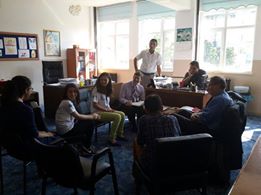
We were in Samsun again on 12 May. We visted our pilot schools which we did not have the opportunity to see for quite a long time. This time our aim was to see how democratic school culture activities are implemented and to interview those who took part in the activities after a long while. Claude Kieffer, long term expert who has recently joined our team, also had the opportunity to see our pilot schools and to have one-to-one dialogue with the implementers of the activities, while malcom Cox, our evaluation expert, had the chance to meet school managers, teachers, students, and parents and ask how they feel about democratic school culture activities.
Before noon we were at Garip Zeycan Science High School. First we met Ahmet Özdemir, the school principal, and coordinating teachers as well as the elective course teacher. We talked about the impact of the elective course and democratic school culture activities on school ethos. Ahmet Özdemir stated that both the elective course on Democracy and Human Rights and democratic school culture activities affect students in a positive way. He underlined that especially in such a school where students academic achievement in the central university examination is rather high and students are mostly numeric oriented, these kinds of activities are crucial for students to discover the social side of life and develop their social skills further. The students we talked to also mentioned that they gained a lot in terms of personal development throughout pilot implementation.
In the afternoon we were at Canik Fatih Middle Scgool. Counselling teachers Mr Ferhat Halilbeşeoğlu, Ms Özlem Bektaş and Mr Aziz Özver took us around and showed us the exhibition for "Exploring Issues around Me" which was opened on 9 May 2014. Then in the counselling teachers' room we had a nice meeting with our teachers, the current and former president of the school parliament and some students who were involved in democratic school culture activities. What is striking in this school is that counsellin teachers have established quite a stron team and consider democratic school culture activities as a tool strengthening their current function as counsellors. They stated that these activities have a positive impact on the psychological and social development of students and they pointed out to the need of establishing a network among counselling teachers.
Europe Day Fair 2014
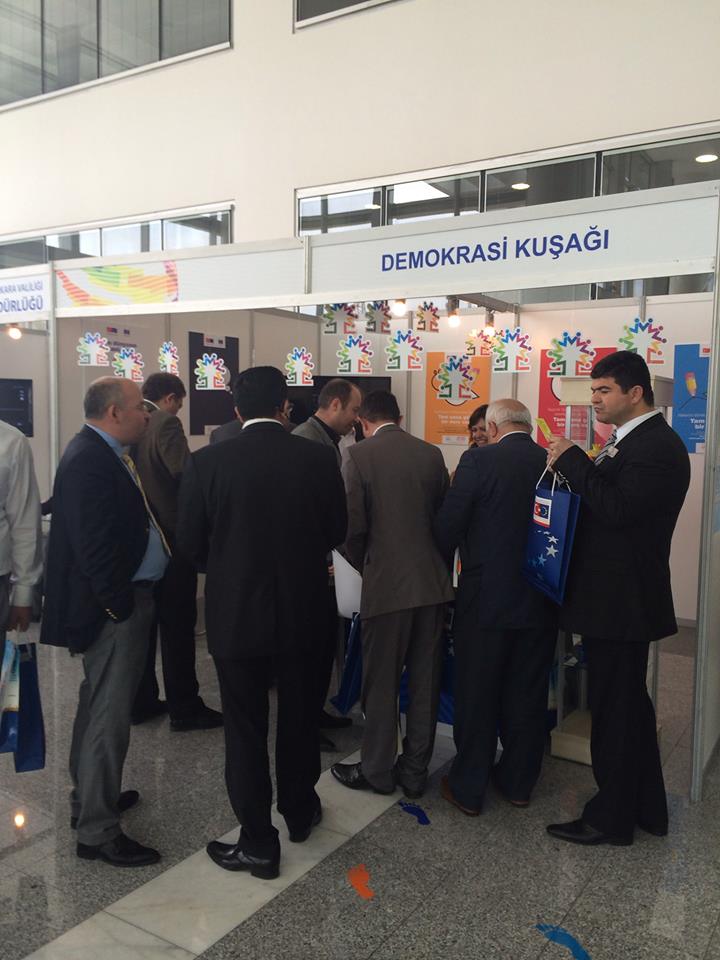
At the Europe Day Fair, which was organised at ATO Congressium in the scope of the celebration of the 9 May "European Day" 2014, many EU funded projects were promoted at 40 stands, 18 of which were allocated to EU Member States, while the rest were reseved for various public institutions including the Ministry of Environment and Urbanisation, Ministry of Transport and Ministry of National Education. The fair had a wide range of participants and Generation Democracy Project had its own stand, where visitors were informed about project activities.
Visitors had the opportunity to look through CoE publications in the field of education while getting information about the project. Among the visitors were studetns from different high schools and middle schools and they spent enjoyible time at the project stand taking part in the games developed by the project team. Those who participated in these games tried to get familiar with the concepts of democracy and human rights and received surprise gifts. The project promotional stand was attractive to all, but became even more appealing and meaningful with the presence of students.
Sixth Project Steering Committee Meeting was held on 10 April 2014
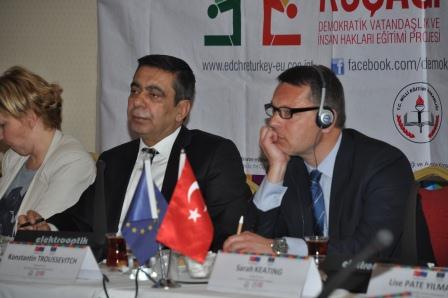
TThe Sixth Project Steering Committee meeting was held in Başkent Öğretmenevi on 10 April 2014. The meeting was chaired by Mr Salih Çelik, Deputy Undersecretary of the Ministry of National Education of Turkey and the Senior Programme Officer of the Project. The meeting brought together representatives of all General Directorates of the MoNE, Central Finance and Contracts Unit, the EU Delegation to Turkey, the Ministry of EU Affairs, the Beneficiary, NGOs, and all the other relevant stakeholders. Ms Sarah Keating, Head, Unit for Regional and Bilateral Co-operation - South East Europe Education Department DG II - Directorate of Democratic Citizenship and Participation Council of Europe; Mr Konstantin Troussevitch, Head of External Presence and Programme Support Department, Directorate General of Programmes Council of Europe, Ms Susanne Martin, Deputy Head of Section, Financial Cooperation, Institution Building and Civil Society, Delegation of the European Union to Turkey, and Mr Salih Çelik, Deputy Undersecretary and Project SPO, on behalf of the Ministry.
Main outcomes of the projects so far and upcoming activities were on the agenda. All project partners emphasized the importance of successful activities of the project and gave the message that they are open for further collaboration in the future. Mr Salih Çelik, Deputy Undersecretary of the MoNE, stated that this project is the biggest investment in Europe in the field of developing curricula for democratic citizinship and human rights education and institutional capacity building. Referring to the idiom: "Not even harm a flea", which reflects one important element of our culture, he also expressed his hope that our young people will become individuals who embrace not only our own cultural values, but also universal values, prefer to work instead of fight and develop solutions through common sense and common mind. Mr Çelik also underlined that the redesigned elective course on "Democracy and Human Rights" is a model both for Turkey and for other European countries and expressed his expectation from the Council of Europe to take concrete steps to transfer this model to other countries in practice. He concluded that capacity building activities are the second most important elements after the pilot implementation and underlined that democratic school culture activities should be extended beyond pilot schools.
In her opening speech, Ms Keating emphasised the importance of quality education. She stated that all the work done throughout the project, together with the revised elective course curriuculum and democratic school culture framework, encourages young people to think in a critical way, and help them develop a number of skills, thus ultimately contributing to quality education. Sha also touched upon her visit in Mardin and expressed how pleased she is with the impact of project outcomes in pilot schools. she further added that putting the redesigned elective course curriculum was the first major step and now its implementation will be strengthened through teacher training seminars. She concluded her words by mentioning that good practises from Turkey will also be shared during the EDC/HRE coordinators meeting to be held in Bakü next month.
Mr Troussevitch expressed that all components of the project are crucial and its outcomes should be promoted not only in Turkey but also in the other countries of the CoE.
Ms Martin, speaking on behalf of the EU Delegation to Turkey, stated that involvement of civil society organisations in project activities is highly important and expressed their hope that the project will maintain its inclusive attitude, even getting stronger.
Mardin
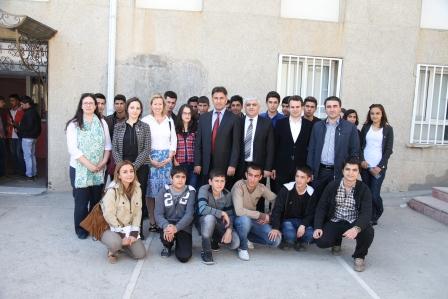
On 8th April, our project team including Ms Sarah Keating, Head of Unit for Regional and Bilateral Co-operation - South East Europe Education Department DG II - Directorate of Democratic Citizenship and Participation Council of Europe and Ms Isabel Cristovam-Bellman, Unit for Regional and Bilateral Co-operation, visited two pilot schools in Mardin. In both schools, they were welcomed very warmly and were impressed by the results of the project activities implemented in schools so far. In Selahaddin Eyyübi Primary and Lower-Secondary, president of the school parliament made a presentation to the delegation. In her presentation, she summarised how they implemented democratic school activities, with a specific focus on the "Democracy Desk". School counselling teacher also provided information about the outcomes of each specific activity and their methodology.
In Mardin Technical and Industrial Vocational High School, project team met the school parliament members. Students proudly presented the accomplishments they have had since the project started. Their belief in the sustainability of the democracy culture was promising. Almost all classroom representatives underlined that they have built a culture in which they feel comfortable and can find solutions to their common problems. This process seems to have empowered students and built their self-confidence, equipping them with necessary skills to negotiate and to solve problems, which is one of the main aims of the elective course on "Democracy and Human Rights", as well as of the activities carried out under the scope of democratic school culture.
Together with our teacher trainers for the third time
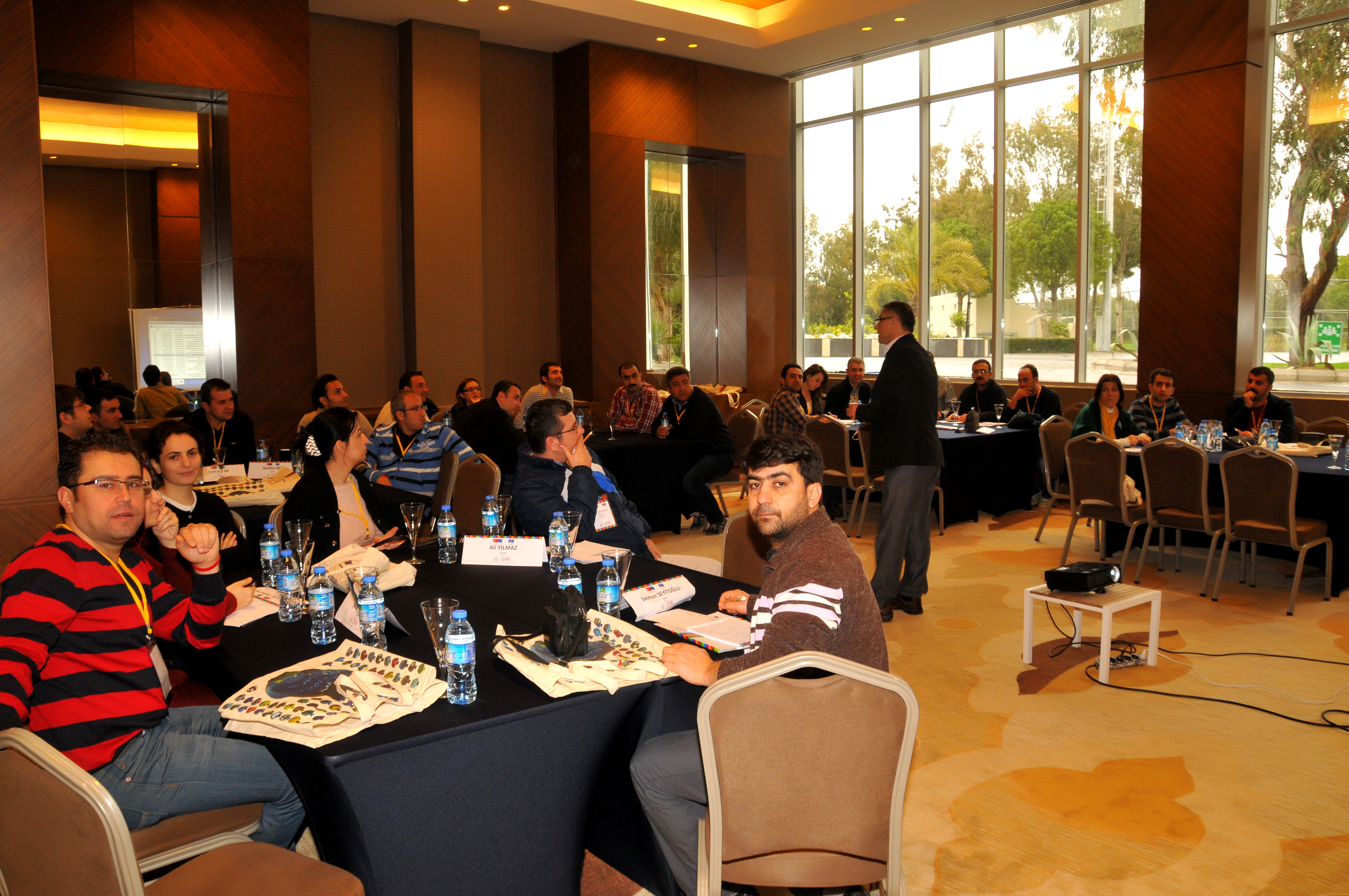
The third seminar for Training of Trainers was organised between 26 - 29 January in Antalya. It was a great reunion of the teacher trainers who attended our seminars during the summer of 2013. This time they were one big group, so there was more than enough room for interaction and sharing of experiences among more than 120 people. Following the completion of seminars addressing school principals, provincial directors, and provincial inspectors teacher trainers were asked to organise their first cascade training seminar in their own provinces. Hence, they came up with a great deal of feedback and new ideas to improve cascade training seminars further in the future. After a general evaluation round, they split into smaller groups and worked with national and international EDC/HRE experts focusing on the themes of the elective course curriculum.
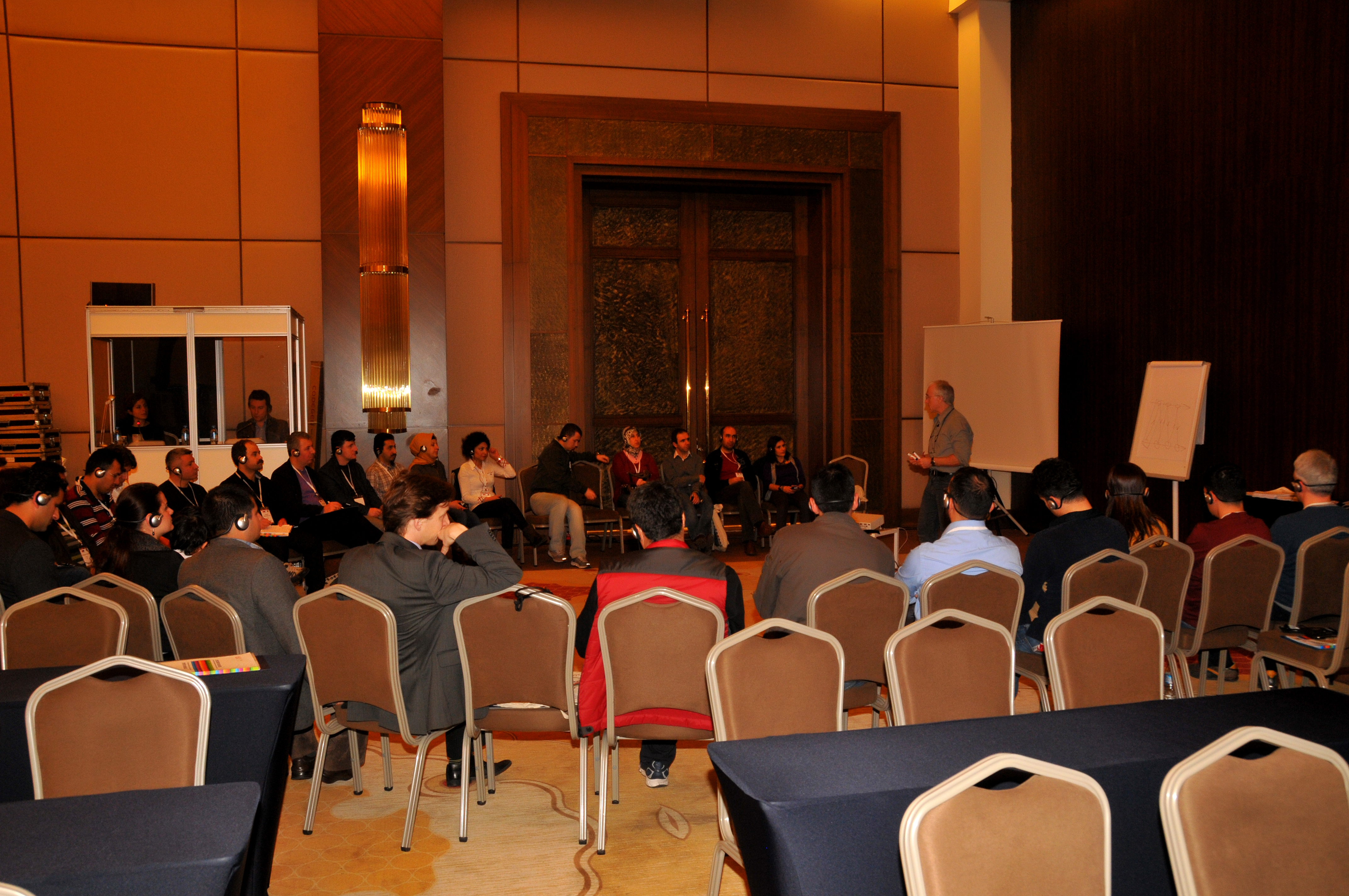
During the workshop, teacher trainers attended sessions with national and foreign experts focusing on different themes of the elective course curriculum on "Democracy and Human Rights" for
secondary schools. The sessions were on a number of themes including democratic system and living democracy, active citizenship, peace and compromise, and team building. Experts
presented model lessons and provided the participants with a set of activities and tools that could be used in cascade trainings to be organised in all provinces addressing
history and philosophy teachers who will be teaching the elective course in 2014-2015 academic year.
Moreover, this time the seminar coincided with another crucial even organised in the scope of Generation Democracy,
all our pilot schools also shared the same venue for four days while they were evaluating the main outcomes of the pilot implementation of the Democratic School Culture Competence Framework.
School principals, teachers, parents and students from 22 pilot schools were present at the venue. It was a unique opportunity for teacher trainers to get familiar
with one of the other components of Generation Democracy and obtain first hand information about the influence of democratic school culture initiatives.
School principals, teachers, parents and students from 22 pilot schools of Generation Democracy convened on 27 January in Antalya.
The presence of students and parents added a great value to the whole event. During the three-day workshop, students and parents not only attended the
workshops but also exhibited the outcomes of their hard work. Each school came up with its own poster design and they were provided with a stall by which
they proudly represented their schools and talked about how they cooperated with different stakeholders to carry out democratic school activities. It was a
thrilling experience for all parties to hear the concrete results of the efforts so far. The way the students expressed themselves and the pride of their parents once more showed how important it is to encourage active participation of stakeholders in school related decisions and activities. Prof. Emin Karip, the Head of Board of Education, and Dr. Hüseyin Şirin, Member of Board of Education, as well as the EDC/HRE Coordinator of Turkey were present
from the beginning until the end. They visited the stands of each pilot school and spoke to school representatives. Their ownership was a vital element of motivation both for pilot schools and for teacher trainers. In his opening speech, Prof. Karip
used the analogy of seeing the full half of the glass and stated that all the efforts made for the democratic school culture competence framework is the full part of the glass,
but there is still a lot to be done in the field which is the empty half that needs to be filled up. He concluded his words emphasising the importance of the
accomplishments in pilot schools and local workshops. The workshop had three main objectives; to evaluate the process and the outcomes of the activitis they implemented in the first semester, to
introduce 7 new activities for the next semester, and to present and share the success stories of pilot schools. Students and parents were active players in
all the workshops. As the amount of feedpack and input collected from pilot schools was huge and precious, Generation Democracy team decided to make a special dossier
about pilot schools, presenting their stories with quotations from the interviews done with different stakeholders. The dossier should be online in the beginning of March.
The Democratic School Culture: From Hand to Hand Workshop in the scope of Generation Democracy Project implemented by the Council of Europe in cooperation
with the Ministry of National Education was organised in Edirne on 6 January 2014. Edirne Technical and Industrial High School and Lala Şahinpaşa Primary School,
which are among the 22 pilot schools from 11 provinces also took part in the workshop. Hüseyin Özcan, the
Provincial Director of National Education and
Ahmet Yakışır, a Branch Manager from the Provincial Directorate were present the whole day. 32 students and 32 parents attended the morning session, and
in the afternoon there were 32 school principals and 32 teachers. Hüseyin Özcan, the
Provincial Director of National Education made the following comments
in his opening speech: “Democracy and human rights are already concepts coded in our culture. Democratic concepts like Living together, tolerating differences, culture of tolerance
are important assets that we already have deep in our history. Our utmost priority regarding these concepts is to teach our students to be human before being a citizen
and to raise them as individuals who are beneficial to humanity as a whole.”
The second step of Democratic Citizenship and Human Rights Education Awareness Workshop was organised in İzmir on 4 - 5 January 2014. Provincial inspectors
of national education attended the workshop. Together with the first step of this awareness workshop which was organised for provincial directors in December,
this workshop also served as a means to inform the leaders in all provinces of Turkey about the two main components of Generation Democracy Project: the elective
course on Democracy and Human Rights, and Democratic School Culture Competence Framework. In order to disseminate the project results to a wider
audience
and to reach most of the teachers who will be teaching the elective course in the 2014 - 2015 academic year, provincial inspectors will support school principals and
teachers in organising cascade training seminars in provinces and raise awareness on a provincial level. The first step of Democratic Citizenship and Human Rights Education Awareness Workshop was organised in Antalya on 7 - 8 December 2013. Provincial directors from
81 provinces attended the workshop and they constitute one of the main parts of the core team, which is planned to be established in each province. The history and philosophy teachers who
attended our seminars throughout the summer of 2013, will organise a two-day seminar for their
colleagues in their provinces in order to disseminate the project results to a wider
audience
and to share their knowledge and experience with the teachers who will be teaching the elective course in the 2014 - 2015 academic year. The support of provincial directorates
is vital for the smooth and sound implementation of cascade trainings in the coming period. The third "Democratic School Culture: From Hand to
Hand" workshop was organised in Manisa. School principals, teachers, parents, and students from a number of schools
attended our workshop today. During the workshop, the school principals of our pilot schools
participated as moderators and shared their experience with their colleagues from other schools.
The most exciting part of the one-day workshop was the presentation of pilot schools students.
They suggested many interesting activities for a democratic school environment. The Fifth Project Steering Committee meeting was held in Başkent Öğretmenevi on 27 November 2013.
The meeting was chaired by Mr Salih Çelik, Deputy Undersecretary of the Ministry of National Education of Turkey and
the Senior Programme Officer of the Project. The meeting brought together
representatives of all General Directorates of the MoNE, Central Finance and
Contracts Unit, the EU Delegation to Turkey, the Ministry of EU Affairs, the
Beneficiary, NGOs, and all the other relevant stakeholders. Ms Sarah Keating,
Head, Unit for Regional and Bilateral Co-operation - South East Europe
Education Department DG II - Directorate of Democratic Citizenship and Participation
Council of Europe represented the secretariat and gave an opening speech along with Mr Erwan Marteil, First
Counsellor, Head of Section, Financial Cooperation, Institution Building and
Civil Society Delegation of the European Union to Turkey and Mr Salih Çelik, Deputy Undersecretary and
Project
SPO, on behalf of the Ministry. In her opening speech Ms Keating emphasised the important role of teachers in the
society:
"Turkey has always been known to value and appreciate teachers. They are considered as one of the main pillars
of the society. An inquisitive mind, love of wisdom and respect for national and international values are
inherent elements of Turkish educators. It is indeed true. Teachers do play an important role in shaping our
generations. That is why the Turkish government invests a lot in the field of education with the greatest share
in the general budget. That is also why in our cooperation with the MoNE, we make sure that we support teachers
to use their existing skills, and going beyond their individual scope, to contribute to the establishment of a
democratic school culture. Only then can we be sure of sustainable generations of democracy. We are witnessing
the development of an example that goes beyond the borders of Turkey and grows into
a model of European good practice." Mr Marteil touched upon the EU Accession process and stated that Turkey has never been closer to accession
in terms of European values and this project has certainly contributed greatly to the process." Referring to Ms Keating's speech, Mr Çelik said "As a nation Turkey is human-oriented and values are inherent
in the society. Although these values are instilled in the society, there is still need to include international
human rights and values in the curriculum so as to put them into practice more systematically. CoE is an
institution that sets the standards for Europe and beyond and the Beneficiary is very well aware of the
professionalism and expertise of the CoE in this field. This project has proved that it was made the right decision. Two concurrent seminars hosted the school principals of the teacher trainers who were trained in the scope of Generation Democracy throughout summer.
The main aim of these seminars was to strengthen the capacity of school principals in EDCHRE education, as well as in adult education as they will be
the leaders in their provinces when the cascade trainings start. Their support to the teacher trainers is of utmost importance to ensure a real transformation
in the school community and to guarantee sustainable results.
This time we were in İstanbul to organise the second "Democratic School Culture: From Hand to
Hand" workshop. School principals, teachers, parents, and students from a number of schools located on the Anatolian side of Istanbul
attended our workshop today. During the workshop, we asked "What does democratic school mean to you?" and the answers given by the students were simply incredible.
The students and parents also suggested many interesting activities for a
democratic school environment. Our next stop will be Manisa on the 2nd of
December.
The first workshop on "Democratic School Culture: From Hand to Hand was organised in Mersin
on 4th November. We were in Mersin to hold the first "Democratic School Culture: From Hand to
Hand" workshop. Having established a core team in our pilot provinces, now we
would like to spread our message and the practises developed by the Democratic
School Culture Working Group to other schools. Our pilot schools have a leading
role in encouraging their peers to take action and to make use of the Democratic
School Culture Competences Framework Manual developed by the Working Group.
Being together with all the stakeholders including parents and students was
incredible. The students of Pakize Kokulu Anatolian
High School and 19 Mayıs Middle School joined the Generation Democracy! A delegation of representatives from the Board of Education and the Ministry of National Education and 12 teacher trainers visited Warsaw between 20 -26 October. The study visit focused on in-service training programmes for teachers and also included a two-day
in-service training for the participants. During the visit, the high level of attention and involvement of the delegation was quite remarkable.
Especially, the teacher trainers in the group found the 2-day seminar on adult education quite useful. Throughout the week,
participants kept a diary of
their daily routine to record
their observations. There was
enough material to use for
different purposes. You can
reach below the study visit
report formally reporting on the
process and the Warsaw Diary,
which presents an informal
account and gives an emotional
touch. A delegation of representatives from the Board of Education and the Ministry of National Education and 12 teacher trainers will depart for Warsaw on 20 October The study visit will focus on in-service training programmes for teachers and will also include a two-day
in-service training for the participants. Accordingly, the participants of the visit are mostly composed of teacher trainers who already
took part in the teacher training seminars that were held in Kızılcahamam and İzmir. In order to select the participants of this visit, we asked
our teacher trainers to draft a one-day (6 hour) training programme to be conducted in their own schools for their fellow teachers. The draft programmes
submitted by the teachers were evaluated based on the following basic criteria: The independent evaluation commission finalised assessing the submitted programmes in an anonymous manner and selected 12 teacher trainers to take part in this first upcoming study visit.
We would like to thank our dear teachers who are committed to this work and who have already contributed greatly to the development of this project.
Zurich revisited: This time with a focus on curriculum and textbook development processes A small delegation of curriculum and textbook developers visited Zurich under the leadership of Mr Ercan Turk, Director General for Secondary Education
of the Ministry of National Education. The programme was hosted by Zurich University of Teacher Education and included visits to publishing houses for textbooks and to schools.
The focus was on the new approaches to textbook and curriculum development, especially in the field of democratic citizenship education and human rights education. The close cooperation
between the Turkish Ministry of National Education and Zurich University of Teacher Education seems to prosper even further with the exchange of inspirational ideas and good practices. A delegation of teachers, school principals and BoE representatives were in Finland to discover the secret behind the success of the
Finnish education system. The programme was hosted by the
Finnish Education Department and included meetings with the representatives of the Education Department, NGOs, and other stakeholders of education. There were also school visits, where the participants had
the opportunity to observe the school culture and ethos in schools. Eventually, it was clear to all participants that the main factor in establishing a sound education system is to have good teachers respected and valued by the
society. In order not to lose the vivid experience of the week, the participants kept a diary of the whole visit. You can read their daily accounts from the link below Second phase of the Training of Trainers (ToT) seminars were organised in İzmir and Kızılcahamam before the academic year started. Both
seminars yielded fruitful results The second part of Training of Trainers (ToT) seminars were organised in İzmir between 25 - 29 August; and in Kızılcahamam between
9 - 13 September. Both seminars yielded fruitful results and maintained the momentum among the candidate teacher trainers.
This time the participants received a more hands-on training on the methodology of the elective course on Democracy and Human Rights.
The seminars focus reflected a shift from teaching to learning, and from conventional to modern and efficient teaching methods keeping
student in the centre of attention and aiming at the improvement of every individual student rather than an overall success. The participants are now expected to start with small steps and reach their closest colleagues and peers in their own schools
and by the end of 2013 they will all have organised a two-day seminar for their colleagues from different schools in their provinces.
They were also challenged to produce the best draft programme and to be productive throughout the seminars in order to be selected as
one of the participants of the Project’s next study visit to Poland. A total of 12 people will be selected to take part in this study
visit which will focus on in-service teacher training as Poland presents a very good model in this area. Capacity Building Working Group aims to increase capacity on individual, organisational and social level. Accordingly, a series of
seminars will be organised in the coming months addressing provincial directors of national education and their deputies, provincial
inspectors, school principles and so on. By ensuring a core team that consists of a committed provincial director, a supportive school
principal, an acknowledged and alert inspector and diligent teacher-trainer, the ultimate aim is to reach as many teachers as possible
in the coming year through cascade trainings and to provide examples of school with good teaching and a democratic school culture.
The Initial Training of the Democratic Citizenship and Human Rights Education Grant Scheme was organised in Ankara on 5 - 6
September for the 30 successful applicants who were found eligible for funding under the EDC/HE Grand Scheme. Representatives of the Council of Europe,
Board of Education of the Ministry of National Education, the European Union Delegation to Turkey and the Central Finance and Contracts Unit were present
to give their support to the process. The training was accomplished with success. During the two-day training the participants were informed extensively
about the administrative and financial management procedures, monitoring and evaluation processes, reporting, etc. of grant projects and they also had the
opportunity to address their questions to the CFCU directly. The second part of Training of Trainers (ToT) Seminars will take place in İzmir between 25 - 29 August; and in Kızılcahamam Between 9 - 13 September.
This time the participants will receive a practical training on the methodology of the elective course on Democracy and Human Rights. The participants
will then organise seminars for their colleagues when they return to their provinces. The approved curriculum of the elective course on Democracy and Human Rights
for upper-secondary schools will be taught on a national scale in the 2014 - 2015 academic year and the intention is to reach as many teachers as possible in the coming year
through cascade trainings. Generation Democracy Project initiated a series of seminars for Training of Trainers (ToT) to ultimately train teachers
who will teach the elective course on Democracy and Human Rights in 2013-2014 school year. The first ToT seminar designed by the Capacity Building Working Group, one of the six Project working groups, started on 24 June 2013
with the opening speeches of Mr Emir Adzovic, Team Leader of the Generation Democracy Project on behalf of the Council of Europe and Dr
Hüseyin Şirin, Board of Education Member. The ToT was planned as a two-phase training. In the first phase, the focus is on the conceptual basis of democracy and human rights.
The academicians taking part in the seminar will work with 82 philosophy and history teachers and refresh their theoretical knowledge.
In the beginning of September the group will reassemble and receive a practical training on the methodology of the elective course on
Democracy and Human Rights. The participants will organise seminars for their colleagues when they return to their provinces. The ultimate
aim is to reach around 12.000 teachers who will be teaching the course in the coming academic year. In his opening speech Mr Adzovic underlined the importance of democratic citizenship and human rights education. He stressed that in a
classroom, it would be enough to have a couple of good mathematicians, historians or physicists for a society to be successful, but it
would definitely not suffice to have only a few students good at citizenship The board member Dr. Hüseyin Şirin started his speech by congratulating all teachers for their work and efforts in 2012 – 2013 school
year and he encouraged them to start each day of the training by congratulating each other. Emphasising the importance of capacity building
in his speech, Şirin stated that they preferred to work especially with young and dynamic teachers. He concluded his words by expressing his
appreciation of participants’ contribution in capacity building efforts by training other history and philosophy teachers in their own provinces. 
Democratic School Culture Competences Framework Pilot Implementation Workshop

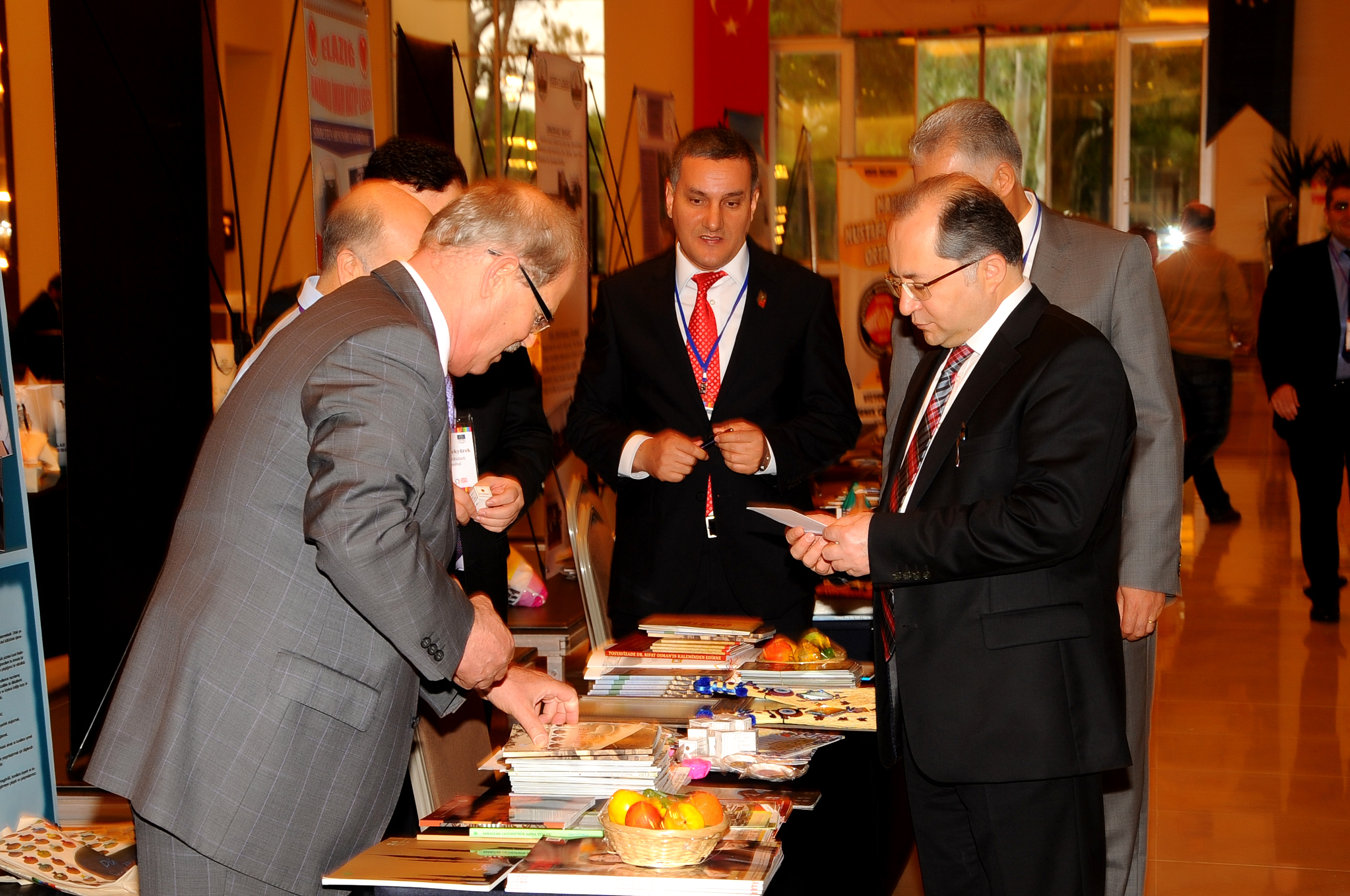

Democratic School Culture: From Hand to Hand Workshop - Edirne
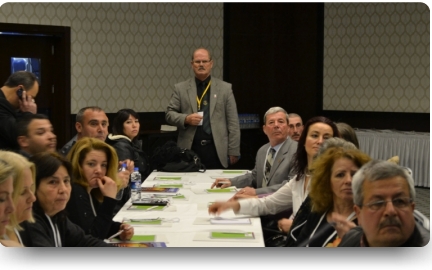
Democratic Citizenship and Human Rights Education Awareness Workshop - İzmir
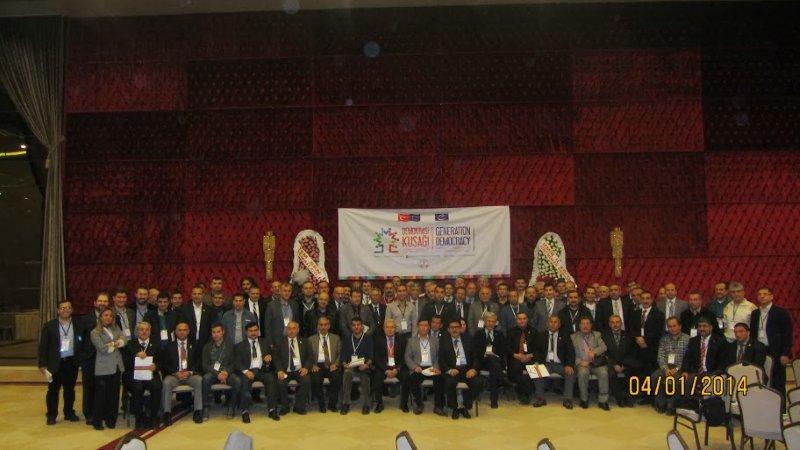
Democratic Citizenship and Human Rights Education Awareness Workshop - Antalya

Democratic School Culture From Hand to
Hand Workshop in Manias
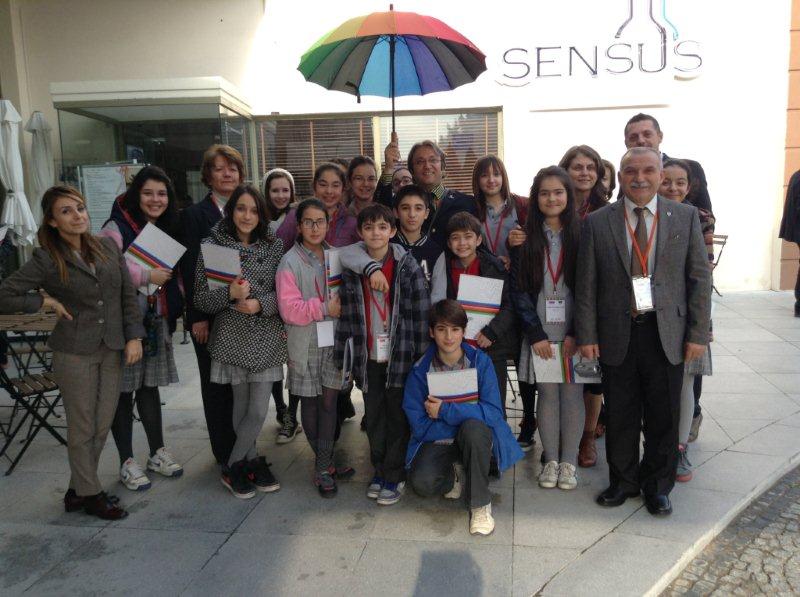
Fifth Project Steering Committee Meeting was held on 27 November
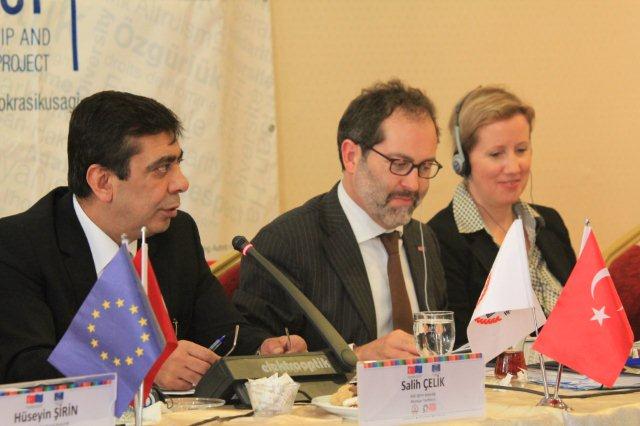
Seminar on Democratic Governance and Leadership at School started in İzmir on 18th November
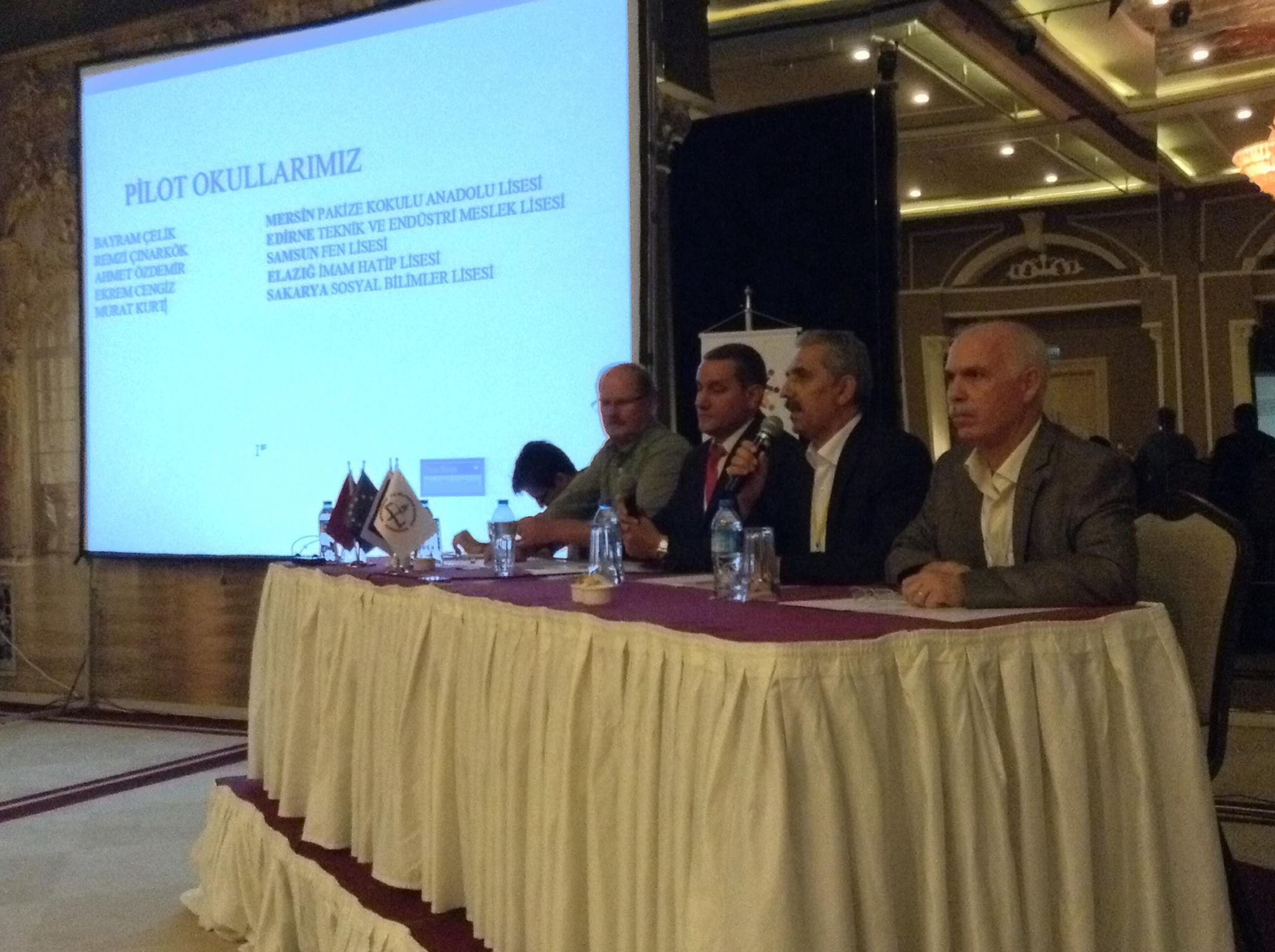
Democratic School Culture: From Hand to Hand Workshop in İstanbul

Democratic School Culture: From Hand to Hand Workshop in Mersin
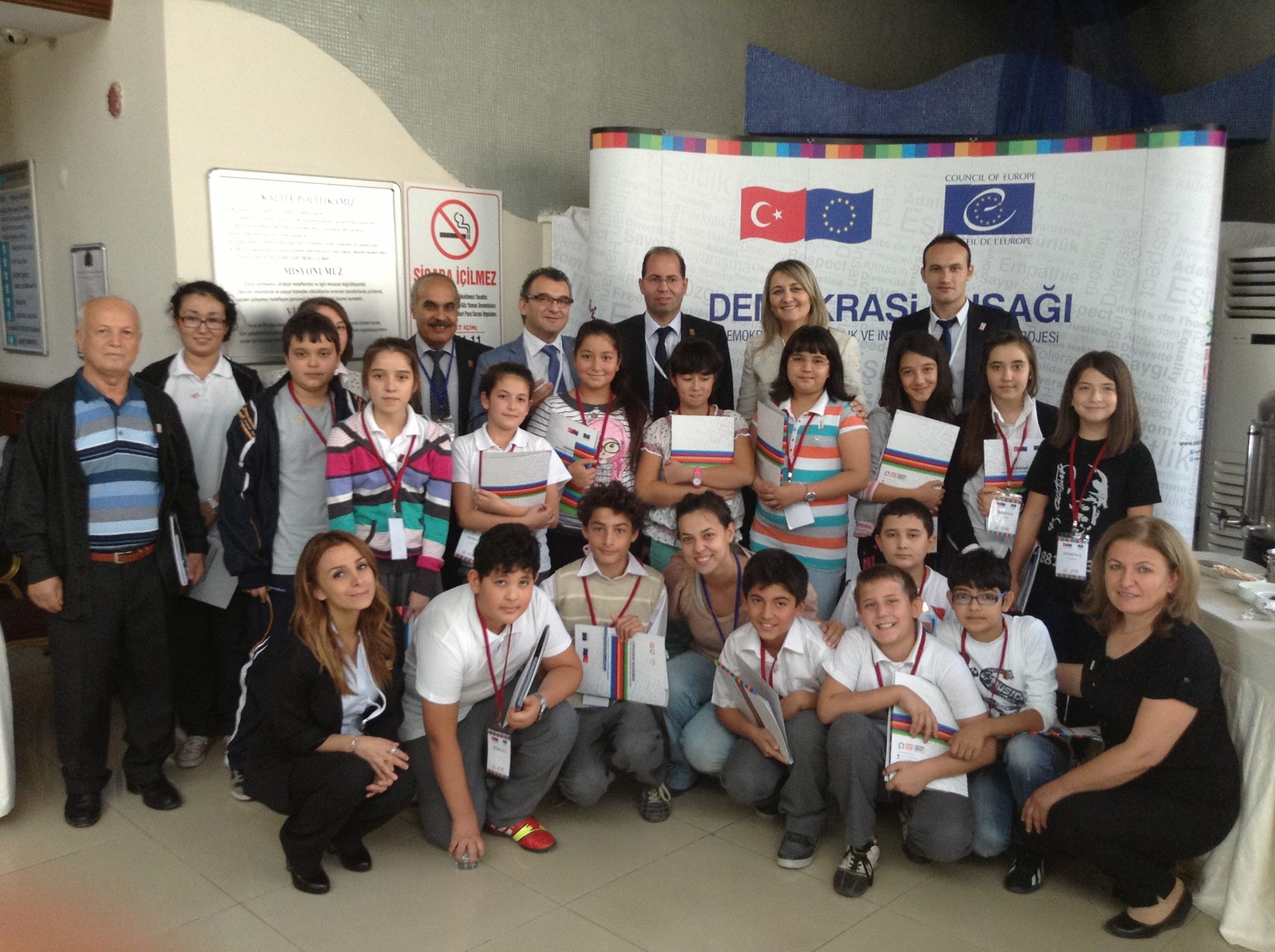
Poland Study Visit - Accomplished

Poland Study Visit - Taking-off to Warsaw on 20 October
Study Visit to Zurich - Continuous Cooperation with Zurich University
for Teacher Education

Case of Finland: The Key to Success is Teachers
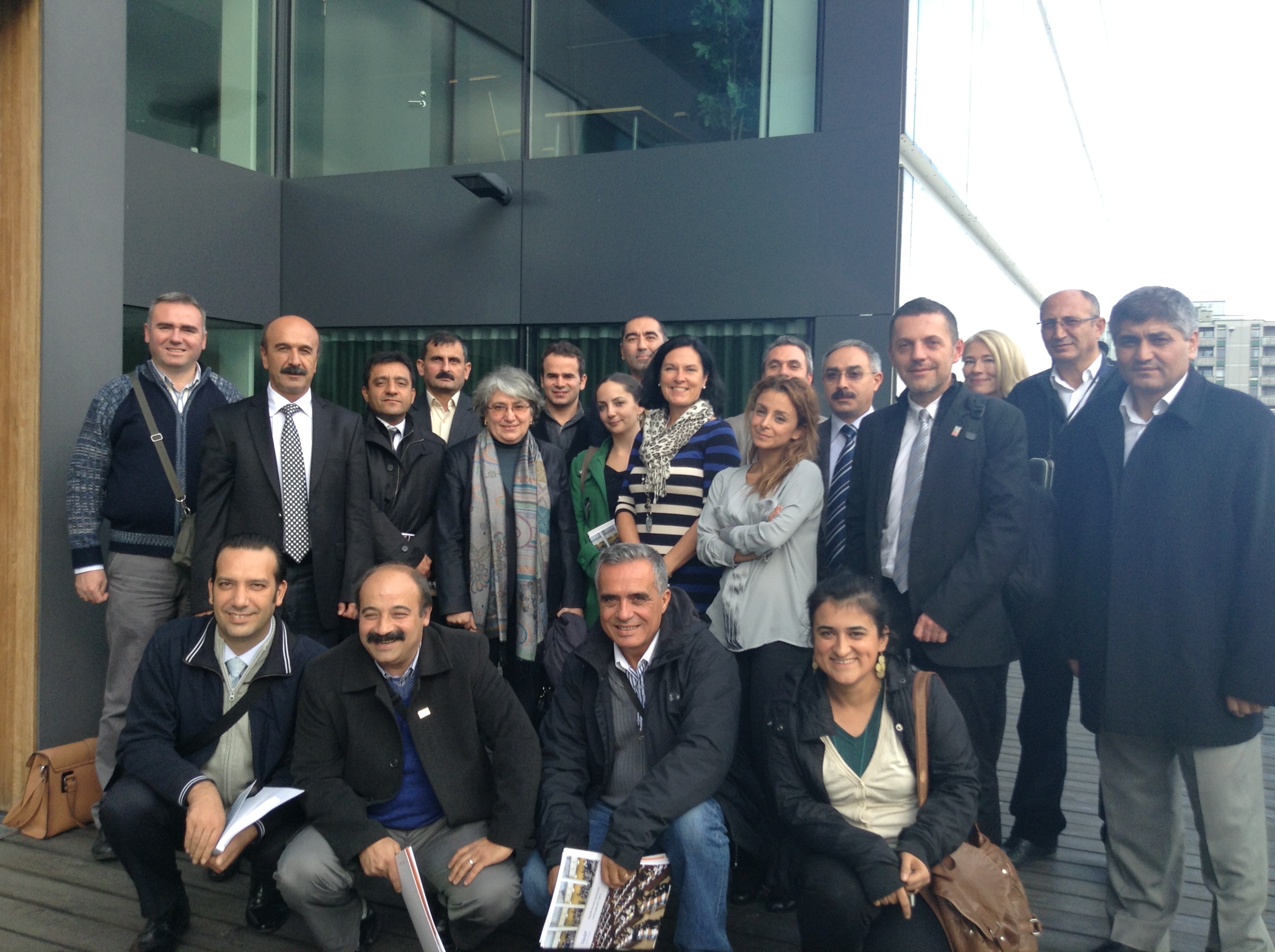
Second Phase of Training of Trainer Seminars Accomplished
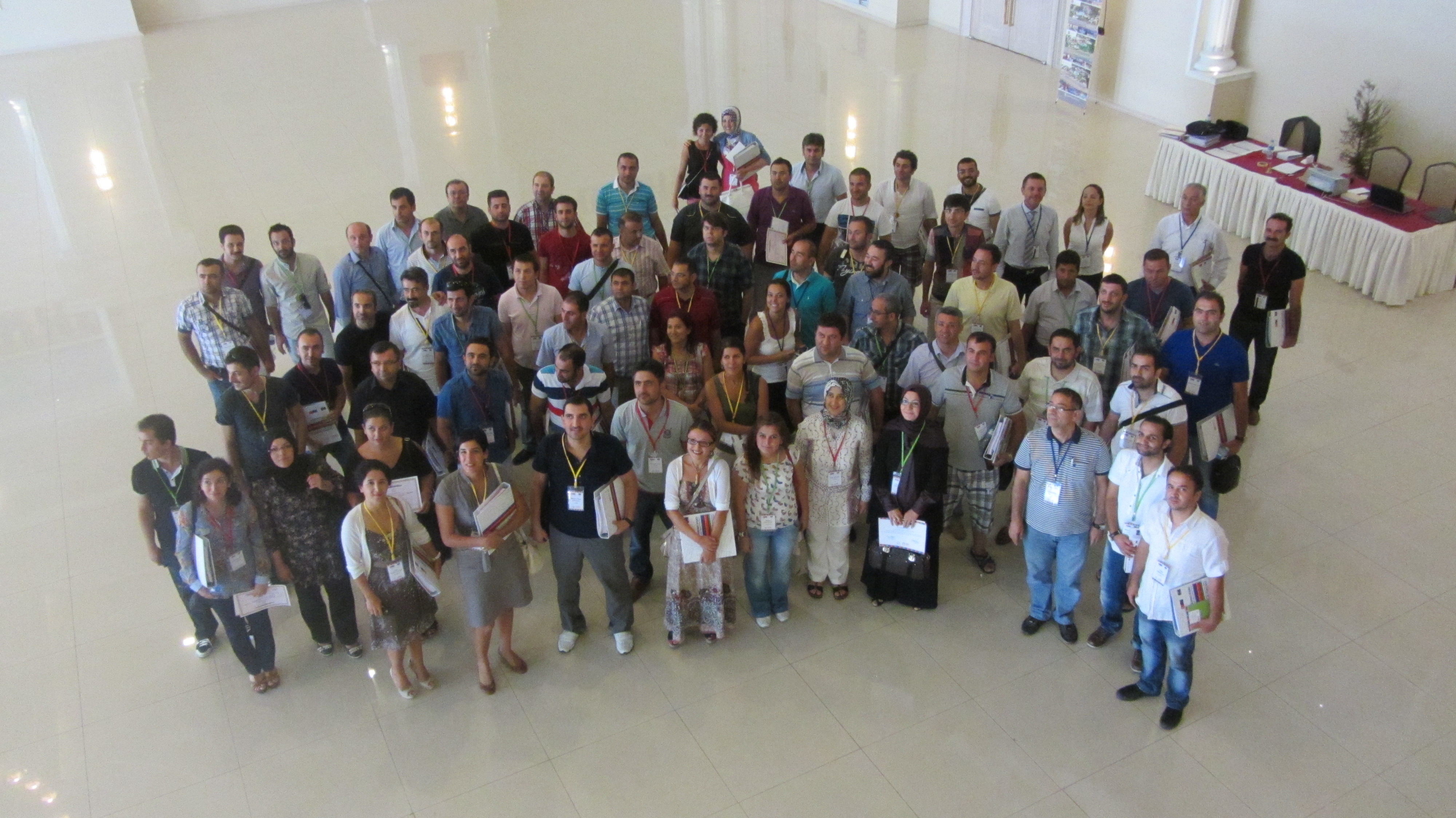
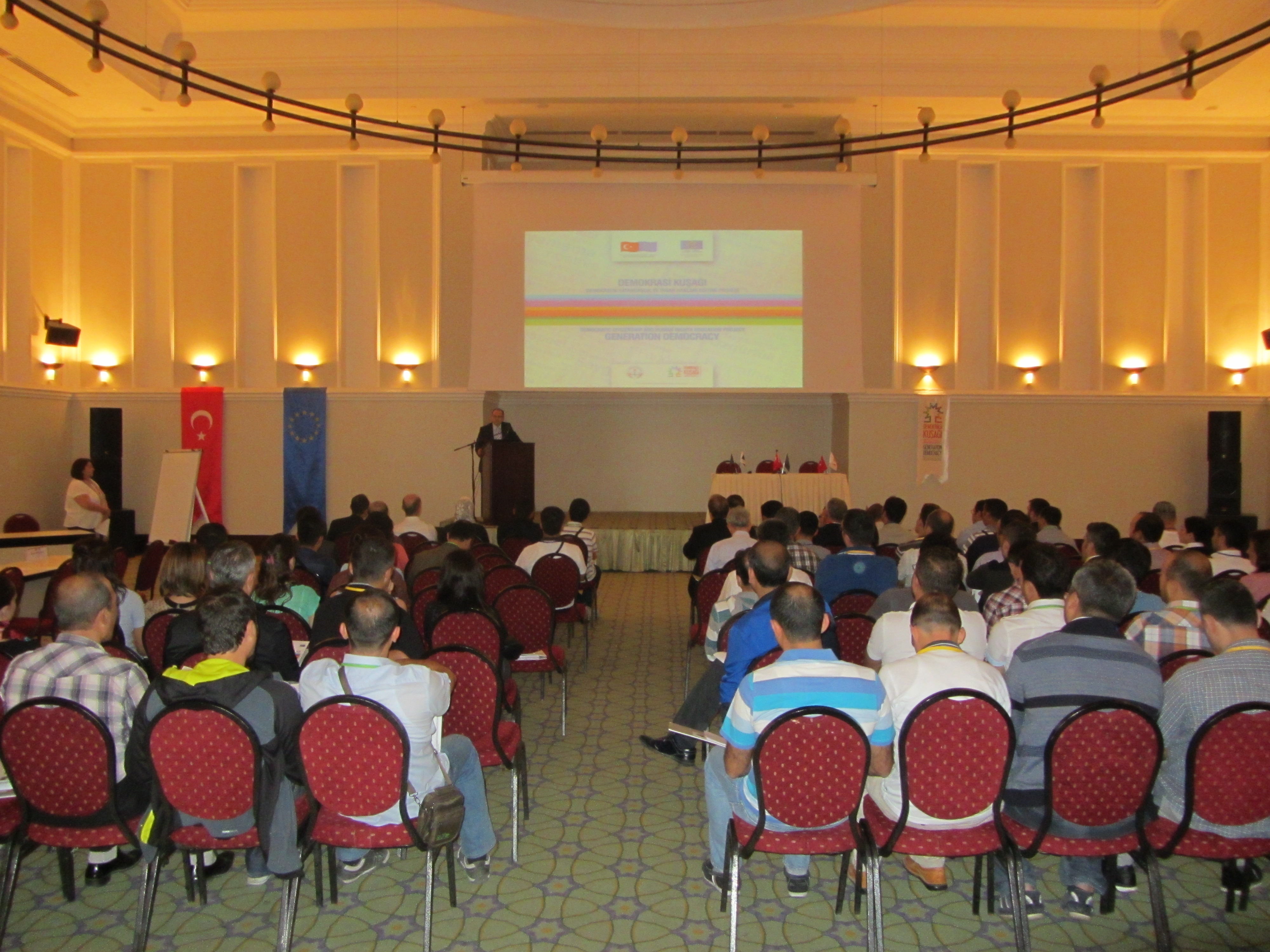
Democratic Citizenship and Human Rights Grant Scheme Initial Training was organised in Ankara
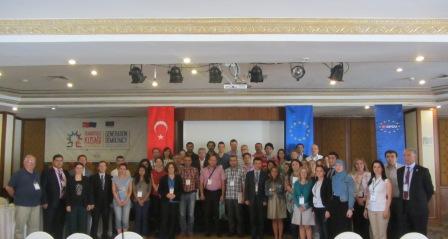
Training of Trainer Seminars Resume
Training of Trainer Seminars Kicked-off in İzmir
